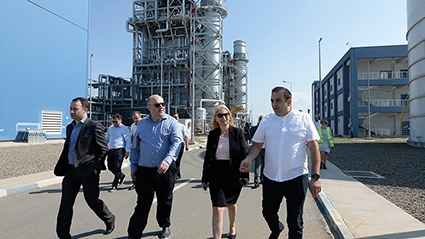Minister of Economy Visits Thermal Power Plants in Gardabani
Georgia is building a new Combined Cycle Thermal Power Plant to increase the country’s power generation and move one step closer towards energy independence. In October 2016, the foundation was laid for the 230 MW Gardabani Thermal Power Plant 2 in Georgia’s Kvemo Kartli region. The town of Gardabani is located approximately 45 kilometers southeast of Tbilisi.
Construction of the plant is scheduled to be completed in 2020, led by Gardabani TPP 2, a subsidiary company of the Georgian Oil and Gas Corporation. The construction works are being completed by Chinese company China Tianchen Engineering Corporation.
The power plant will be able to launch from zero via an autonomous/independent diesel generator, which allows the plant to start up even during a system black-out, resulting in more reliability and a higher standard of safety. The fact that the plant is a combined cycle increases energy-efficiency with a productivity factor exceeding 50%. The station will be equipped with a modern electric generator with both gas and steam turbines and generators.
A sister thermal power plant, Gardabani 1, has been operating since 2015. It is also a 230 MW station and is one of the largest energy producers in the country, generating more than 10% of Georgia’s total energy. Approximately 20% of all of Georgia’s energy needs are met by thermal power, yet the latest Galt & Taggart Electricity Market Watch, from October 2018, reported that thermal power generation in Georgia had reduced by 17.2% year-on-year.
This past week, Minister of Economy and Sustainable Development Natia Turnava visited Gardabani to meet the managers and staff of the two thermal power plants. She confirmed that construction is on schedule and the station will be operational by early 2020. Turnava was accompanied by Director General of the Georgian Oil and Gas Corporation, Giorgi Bakhtadze, and David Tvalabeishvili, Deputy Minister of Economy and Sustainable Development.
Turnava said that the government, and her ministry, is taking significant steps to support the country's energy security. She noted that, as hydropower plants are based on Georgia’s own resources, they will improve energy security and reliability for the country. “This will be an additional capacity that will strengthen our energy independence. The station is being built according to the construction schedule with the latest technologies and we will soon have this wonderful facility up and running,” Turnava added.
In a 2018 op-ed for GEORGIA TODAY, Bachana Pipia, professor at the Georgian Technical University, outlined the pros and cons of thermal energy production, noting that thermal power plants run using a selection of imported raw materials, which will indirectly increase reliance on other countries.
By Samantha Guthrie
Photo: Ministry of Economy and Sustainable Development











